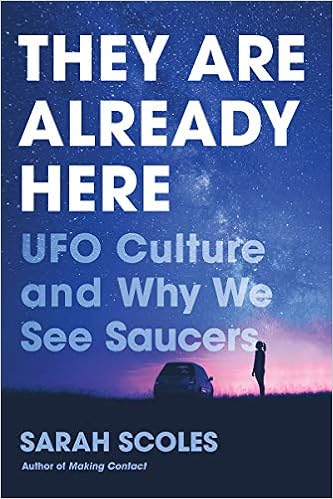
Sarah Scoles, author of the forthcoming They Are Already Here: UFO Culture and Why We See Saucers makes the case:
In their recent paper, the SETI scientists present a case for closing the gap between their work and that of people like Seager, putting SETI back on the astrobiology continuum. And that’s looking pretty possible: The House Appropriations Bill that Congress passed in April 2018 directed NASA to start including searches for “technosignatures” in its broader search for life beyond Earth. In September of that year, interested parties gathered to discuss what that would look like. Information from the SETI luminaries’ paper, arguing that their search belongs back within the sanctioned fold, will soon be considered by a committee that determines astronomy’s priorities for the coming decade. If things go well, “little green men” will be a warm joke, not a harsh slur, in the 2020s…
Perhaps the alien hunters offer a way for scientific insiders and outsiders to get along. Proper science is now more willing to embrace SETI: Astronomer Jill Tarter, one of the search’s pioneers, received radio astronomy’s highest honor—the Janksy Lectureship—in 2014. The chair of the Harvard astronomy department has repeatedly and very publicly suggested that an interstellar object called Oumuamua, cruising through the solar system, could be a visiting spaceship. A scientist at NASA’s Ames Research Center recently proposed new SETI strategies—and included a radical idea: Astronomers shouldn’t cover their eyes to UFO reports. “I think the approach the scientific community could take … is very similar to what SETI has done so far: find the signal in the noise,” he wrote. “In the very large amount of ‘noise’ in UFO reporting there may be ‘signals’ however small, that indicate some phenomena that cannot be explained or denied.”
Don’t just ignore all the outliers as outliers, in other words: Important truth, if not whole truth, can lurk inside of them too.
Sarah Scoles, “What Scientists Can Learn From Alien Hunters” at Wired
But then the consensus boffins will have fewer groups to reject, in order to hang onto their status without really doing anything…
See also: The scientific revolution depended in part on disproven theories Many true tales of science are not the subjects of lectern oratory. Here’s one: brain localization. How did the idea develop? Originally via phrenology.
and
BioLogos is marketing theistic evolution and “consensus science” to Christian schools In the real world, this is not the time to be buying into “consensus” but to be advocating reform.